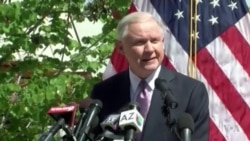U.S. Attorney General Jeff Sessions vowed to crack down on unauthorized immigrants during a visit to the U.S.-Mexico border at Nogales, Arizona, Tuesday.
Using language that was at times blunt, the nation's top law enforcement official promised to use existing laws to step up criminal immigration enforcement.
“For those that continue to seek improper and illegal entry into this country, be forewarned: This is a new era. This is the Trump era," Sessions declared to an audience of Customs and Border Protection personnel.
"The lawlessness, the abdication of duty to enforce our laws, and the catch and release policies of the past are over,” Sessions added.
Watch: AG Jeff Sessions Promises Hard-line Approach
Sessions said he was issuing a memo mandating prosecutors to prioritize immigration enforcement on offenses that were not “prosecuted in the past.”
His directives already exist under U.S. law, the order only “mandates” U.S. attorneys to make such enforcement a priority. And it won't be the first time U.S. officials have taken a hardline approach.
“These are definitely all laws on the books, but their use has been up and down a bit. The illegal entry and reentry is nothing new at all. Previous administrations have taken a very hard line on border prosecutions over the past several years,” says Sirine Shebaya, a lawyer and immigrants’ rights activist.
The American Civil Liberties Union's (ACLU) Policy Counsel on border and immigration issues, Chris Rickerd, says a mandate like the one Sessions issued Tuesday can conflict with the priorities in a federal district. Federal prosecutors are in the best position to know what their community needs, and while that may be to prioritize immigration-related crimes, it isn't necessarily, says Rickerd.
"Each U.S. attorney has a finite quantity of resources that should be expended on the most important offenses," says Rickerd.
Session's directive also included requiring federal prosecutors to take action against those who harbor or transport an undocumented immigrant.
"We are going to shut down and jail those who have been profiting off this lawlessness — people smuggling gang members across the border, helping convicted criminals re-enter this country and preying on those who don’t know how dangerous the journey can be," Sessions specified.
But the directive opens the door to wider interpretation. It could be a substantial change in practice, depending on how the harboring issue is handled by prosecutors moving forward.
“Harboring can be a good Samaritan or someone trying to provide basic human necessities to the migrants," Rickerd explains.
Prioritizing immigration enforcement
In addition, Sessions directed that undocumented immigrants be charged with committing document fraud and aggravated identity theft, “the latter carrying a two-year minimum mandatory sentence,” he said.
Those detained at the border trying to cross into the U.S. will face civil action, and deportation is set to be the only punishment.
Undocumented immigrants who illegally re-enter the country after prior removal will be referred for felony prosecution.
Sessions added that each U.S. Attorney’s Office will designate an Assistant United States Attorney as the Border Security Coordinator for their district.
“It will be this experienced prosecutor’s job to coordinate the criminal immigration enforcement response for their respective offices,” he added.
Sessions also said the Department of Justice will hire 50 new immigration judges this year and streamline the hiring process; that increase will come in addition to 26 judges appointed by former Attorney General Loretta Lynch, who were sworn in since the beginning of the year.






